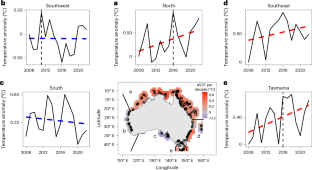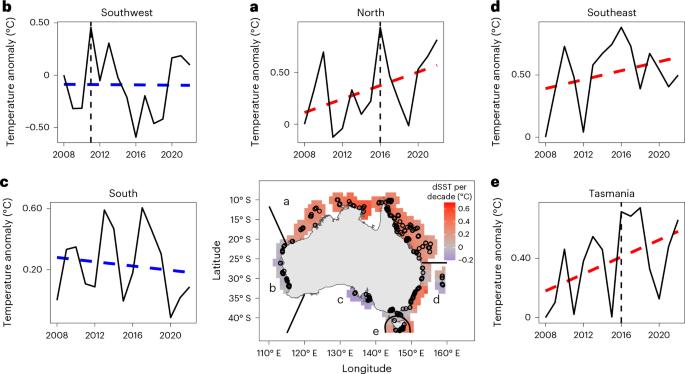Limited net poleward movement of reef species over a decade of climate extremes
IF 29.6
1区 地球科学
Q1 ENVIRONMENTAL SCIENCES
引用次数: 0
Abstract
Warming seas are expected to drive marine life poleward. However, few systematic observations confirm movement among entire communities at both warm and cool range edges. We analysed two continent-scale reef monitoring datasets to quantify changes in latitudinal range edges of 662 Australian shallow-water reef fishes and invertebrates over a decade punctuated by climate extremes. Temperate and tropical species both showed little net movement overall, with retreat often balancing expansion across the continent. Within regions, however, range edges shifted ~100 km per decade, on average, in the poleward or equatorward directions expected from warming or cooling. Although some species responded rapidly to temperature change, we found little evidence for mass poleward migration over the decade. Previous studies based on extreme species observations, rather than tracking all species through time, may have overestimated the prevalence, magnitude and longevity of range shifts amongst marine taxa. The authors use 12 years of broadscale survey data across 838 temperate and tropical coastal sites to investigate shifts in marine taxa range edges at the community level. They show that while some species respond rapidly to change, evidence for mass poleward migration is limited.


十年极端气候期间珊瑚礁物种向极地的净移动有限
海洋变暖预计会推动海洋生物向极地移动。然而,很少有系统的观测能证实整个群落在温暖和寒冷范围边缘的移动。我们分析了两个大陆尺度的珊瑚礁监测数据集,以量化澳大利亚 662 种浅水珊瑚礁鱼类和无脊椎动物的纬度分布区边缘在极端气候的十年间的变化。温带和热带物种总体上几乎没有净移动,在整个大陆上,退缩往往与扩张相平衡。然而,在同一区域内,物种分布边缘平均每十年向气候变暖或变冷所预期的极地或赤道方向移动约 100 公里。尽管一些物种对温度变化做出了快速反应,但我们几乎没有发现在这十年中物种大规模向极地迁移的证据。以前的研究是基于极端物种的观察,而不是对所有物种进行时间追踪,因此可能高估了海洋生物分类群中范围迁移的普遍性、幅度和持续时间。
本文章由计算机程序翻译,如有差异,请以英文原文为准。
求助全文
约1分钟内获得全文
求助全文
来源期刊

Nature Climate Change
ENVIRONMENTAL SCIENCES-METEOROLOGY & ATMOSPHERIC SCIENCES
CiteScore
40.30
自引率
1.60%
发文量
267
审稿时长
4-8 weeks
期刊介绍:
Nature Climate Change is dedicated to addressing the scientific challenge of understanding Earth's changing climate and its societal implications. As a monthly journal, it publishes significant and cutting-edge research on the nature, causes, and impacts of global climate change, as well as its implications for the economy, policy, and the world at large.
The journal publishes original research spanning the natural and social sciences, synthesizing interdisciplinary research to provide a comprehensive understanding of climate change. It upholds the high standards set by all Nature-branded journals, ensuring top-tier original research through a fair and rigorous review process, broad readership access, high standards of copy editing and production, rapid publication, and independence from academic societies and other vested interests.
Nature Climate Change serves as a platform for discussion among experts, publishing opinion, analysis, and review articles. It also features Research Highlights to highlight important developments in the field and original reporting from renowned science journalists in the form of feature articles.
Topics covered in the journal include adaptation, atmospheric science, ecology, economics, energy, impacts and vulnerability, mitigation, oceanography, policy, sociology, and sustainability, among others.
 求助内容:
求助内容: 应助结果提醒方式:
应助结果提醒方式:


